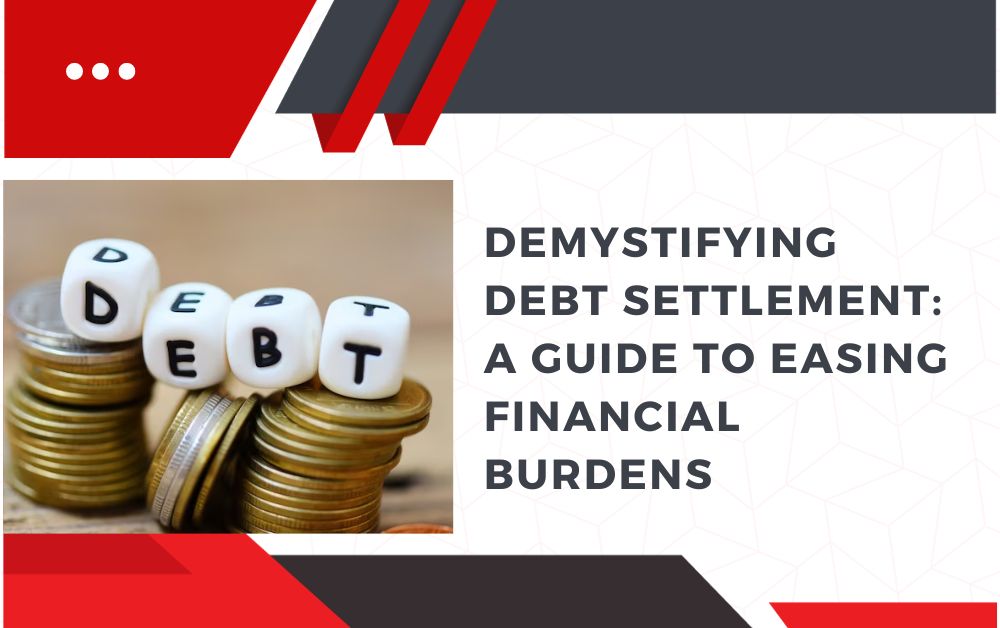Introduction
In today’s complex financial landscape, many individuals find themselves burdened by debts. This blog aims to demystify the concept of Debt Settlement, offering clear and simple explanations for everyone, whether you’re struggling with personal debts or simply seeking to understand the process. We’ll use everyday language and a friendly tone to guide you through this financial journey.
What is Debt Settlement?
Debt settlement is a process where you negotiate with your creditors to pay off your debt for less than the total amount owed. It’s a lifeline for those facing financial hardships and searching for a way out of debt.
The Basics of Debt Settlement
Understanding Your Debt
Before delving into debt settlement, it’s essential to grasp the nature of your debt. Different types of debts exist, such as credit card debt, student loans, and medical bills, each with its unique settlement options.
The Role of Debt Settlement Companies
Debt settlement companies act as intermediaries, negotiating with creditors on your behalf. They aim to reduce your debt burden to a manageable level. However, choosing a reputable company is crucial.
How Does Debt Settlement Work?
The Negotiation Process
Debt settlement involves discussions with creditors to agree on accepting a lump-sum payment, typically lower than the total debt owed.
Establishing a Dedicated Fund
You may be advised to set aside a specific amount regularly into a dedicated savings account. This fund will be used to pay the negotiated settlement amount.
Impact on Credit Score
It’s important to note that debt settlement can adversely affect your credit score, potentially remaining on your credit report for up to seven years.
Pros and Cons of Debt Settlement
Pros
- Reduced Debt Amount: Debt settlement may lead to paying less than your original debt.
- Avoiding Bankruptcy: It serves as an alternative to declaring bankruptcy, which has severe long-term consequences.
Cons
- Credit Score Impact: Your credit score may suffer as a result.
- Tax Implications: Forgiven debt might be considered taxable income.
- Potential Scams: Beware of fraudulent debt settlement companies.

Selecting a Debt Settlement Company
Research and Reviews
Prioritize companies with positive reviews, and verify their reputation with organizations like the Better Business Bureau.
Fee Structure
Comprehend how the company charges for its services. Avoid firms that demand fees before settling your debts.
Transparency and Communication
Opt for a company that maintains transparency throughout the process and maintains clear communication with you.
The Process of Working with a Debt Settlement Company
Initial Consultation
Most companies initiate the process with a consultation, evaluating your financial situation to determine if debt settlement is the right path for you.
Agreement and Plan
If you decide to proceed, an agreement is established with the company. They then devise a plan for fund allocation and creditor negotiations.
Negotiation and Settlement
The company negotiates with your creditors. Once an agreement is reached, you’ll utilize the funds you’ve saved to pay the mutually agreed-upon settlement amount.
Alternative Options to Debt Settlement
Debt Management Plans
These plans involve collaboration with a credit counseling agency to systematically pay off your debts over time.
Debt Consolidation
Debt consolidation entails merging multiple debts into a single loan with a lower interest rate.
Bankruptcy
In extreme cases, bankruptcy might be contemplated. While it provides a fresh start, it has significant long-term repercussions on your credit.
Tips for a Successful Debt Settlement Journey
Stay Informed
Familiarize yourself with every facet of your agreement with the debt settlement company.
Keep Records
Maintain meticulous records of all communications and financial transactions related to your debt settlement.
Patience is Key
Debt settlement can be a time-consuming process, so exercising patience is crucial.
The Impact of Debt Settlement on Your Financial Future
Short-Term vs Long-Term Effects
While there might be short-term setbacks, like a lower credit score, the long-term relief of reducing your debt can be invaluable.
Rebuilding Credit
After settlement, focus on rebuilding your credit. This includes paying bills on time and managing new credit responsibly.
Financial Planning
Use this experience as an opportunity to enhance your financial planning skills and avoid future debt troubles.
Conclusion: Is Debt Settlement Right for You?
Deciding on debt settlement requires careful assessment of your financial situation and understanding its implications. It’s not a one-size-fits-all solution but can be a viable option for those grappling with substantial debt and looking to evade bankruptcy.
Remember, the objective is not only to settle your current debts but also to set a course towards a more stable financial future. If you choose this path, select a reputable debt settlement company, stay well-informed throughout the process, and transform this experience into a catalyst for better financial habits.
Debt can be overwhelming, but there are ways to navigate through it. With the right approach, debt settlement can be a stepping stone towards regaining your financial freedom and building a more secure future.
Also read our other blog :- Understanding Debt Settlement: A Simplified Guide

